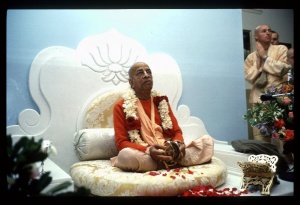CC Adi 5.141: Difference between revisions
m (1 revision(s)) |
(Vanibot #0054 edit - transform synonyms into clickable links, which search similar occurrences) |
||
| (One intermediate revision by one other user not shown) | |||
| Line 1: | Line 1: | ||
{{ | [[Category:Sri Caitanya-caritamrta - Adi-lila Chapter 05|C141]] | ||
<div style="float:left">'''[[Sri Caitanya-caritamrta|Śrī Caitanya-caritāmṛta]] - [[CC Adi|Ādi-līlā]] - [[CC Adi 5|Chapter 5: The Glories Of Lord Nityānanda Balarāma]]'''</div> | |||
<div style="float:right">[[File:Go-previous.png|link=CC Adi 5.140|Ādi-līlā 5.140]] '''[[CC Adi 5.140|Ādi-līlā 5.140]] - [[CC Adi 5.142|Ādi-līlā 5.142]]''' [[File:Go-next.png|link=CC Adi 5.142|Ādi-līlā 5.142]]</div> | |||
{{CompareVersions|CC|Adi 5.141|CC 1975|CC 1996}} | |||
{{RandomImage}} | |||
==== TEXT 141 ==== | ==== TEXT 141 ==== | ||
<div | <div class="verse"> | ||
yasyāṅghri-paṅkaja-rajo ’khila-loka-pālair | :yasyāṅghri-paṅkaja-rajo ’khila-loka-pālair | ||
mauly-uttamair dhṛtam upāsita-tīrtha-tīrtham | :mauly-uttamair dhṛtam upāsita-tīrtha-tīrtham | ||
brahmā bhavo ’ham api yasya kalāḥ kalāyāḥ | :brahmā bhavo ’ham api yasya kalāḥ kalāyāḥ | ||
śrīś codvahema ciram asya nṛpāsanaṁ kva | :śrīś codvahema ciram asya nṛpāsanaṁ kva | ||
</div> | </div> | ||
| Line 14: | Line 18: | ||
==== SYNONYMS ==== | ==== SYNONYMS ==== | ||
<div | <div class="synonyms"> | ||
''[//vanipedia.org/wiki/Special:VaniSearch?s=yasya&tab=syno_o&ds=1 yasya]'' — whose; ''[//vanipedia.org/wiki/Special:VaniSearch?s=aṅghri&tab=syno_o&ds=1 aṅghri]-[//vanipedia.org/wiki/Special:VaniSearch?s=paṅkaja&tab=syno_o&ds=1 paṅkaja]'' — lotuslike feet; ''[//vanipedia.org/wiki/Special:VaniSearch?s=rajaḥ&tab=syno_o&ds=1 rajaḥ]'' — the dust; ''[//vanipedia.org/wiki/Special:VaniSearch?s=akhila&tab=syno_o&ds=1 akhila]-[//vanipedia.org/wiki/Special:VaniSearch?s=loka&tab=syno_o&ds=1 loka]'' — of the universal planetary systems; ''[//vanipedia.org/wiki/Special:VaniSearch?s=pālaiḥ&tab=syno_o&ds=1 pālaiḥ]'' — by the masters; ''[//vanipedia.org/wiki/Special:VaniSearch?s=mauli&tab=syno_o&ds=1 mauli]-[//vanipedia.org/wiki/Special:VaniSearch?s=uttamaiḥ&tab=syno_o&ds=1 uttamaiḥ]'' — with valuable turbans on their heads; ''[//vanipedia.org/wiki/Special:VaniSearch?s=dhṛtam&tab=syno_o&ds=1 dhṛtam]'' — accepted; ''[//vanipedia.org/wiki/Special:VaniSearch?s=upāsita&tab=syno_o&ds=1 upāsita]'' — worshiped; ''[//vanipedia.org/wiki/Special:VaniSearch?s=tīrtha&tab=syno_o&ds=1 tīrtha]-[//vanipedia.org/wiki/Special:VaniSearch?s=tīrtham&tab=syno_o&ds=1 tīrtham]'' — the sanctifier of the holy places; ''[//vanipedia.org/wiki/Special:VaniSearch?s=brahmā&tab=syno_o&ds=1 brahmā]'' — Lord Brahmā; ''[//vanipedia.org/wiki/Special:VaniSearch?s=bhavaḥ&tab=syno_o&ds=1 bhavaḥ]'' — Lord Śiva; ''[//vanipedia.org/wiki/Special:VaniSearch?s=aham&tab=syno_o&ds=1 aham] [//vanipedia.org/wiki/Special:VaniSearch?s=api&tab=syno_o&ds=1 api]'' — even I; ''[//vanipedia.org/wiki/Special:VaniSearch?s=yasya&tab=syno_o&ds=1 yasya]'' — of whom; ''[//vanipedia.org/wiki/Special:VaniSearch?s=kalāḥ&tab=syno_o&ds=1 kalāḥ]'' — portions; ''[//vanipedia.org/wiki/Special:VaniSearch?s=kalāyāḥ&tab=syno_o&ds=1 kalāyāḥ]'' — of a plenary portion; ''[//vanipedia.org/wiki/Special:VaniSearch?s=śrīḥ&tab=syno_o&ds=1 śrīḥ]'' — the goddess of fortune; ''[//vanipedia.org/wiki/Special:VaniSearch?s=ca&tab=syno_o&ds=1 ca]'' — and; ''[//vanipedia.org/wiki/Special:VaniSearch?s=udvahema&tab=syno_o&ds=1 udvahema]'' — we carry; ''[//vanipedia.org/wiki/Special:VaniSearch?s=ciram&tab=syno_o&ds=1 ciram]'' — eternally; ''[//vanipedia.org/wiki/Special:VaniSearch?s=asya&tab=syno_o&ds=1 asya]'' — of Him; ''[//vanipedia.org/wiki/Special:VaniSearch?s=nṛpa&tab=syno_o&ds=1 nṛpa]-[//vanipedia.org/wiki/Special:VaniSearch?s=āsanam&tab=syno_o&ds=1 āsanam]'' — the throne of a king; ''[//vanipedia.org/wiki/Special:VaniSearch?s=kva&tab=syno_o&ds=1 kva]'' — where. | |||
</div> | </div> | ||
| Line 21: | Line 25: | ||
==== TRANSLATION ==== | ==== TRANSLATION ==== | ||
<div | <div class="translation"> | ||
“What is the value of a throne to Lord Kṛṣṇa? The masters of the various planetary systems accept the dust of His lotus feet on their crowned heads. That dust makes the holy places sacred, and even Lord Brahmā, Lord Śiva, Lakṣmī and I Myself, who are all portions of His plenary portion, eternally carry that dust on our heads.” | “What is the value of a throne to Lord Kṛṣṇa? The masters of the various planetary systems accept the dust of His lotus feet on their crowned heads. That dust makes the holy places sacred, and even Lord Brahmā, Lord Śiva, Lakṣmī and I Myself, who are all portions of His plenary portion, eternally carry that dust on our heads.” | ||
</div> | </div> | ||
| Line 28: | Line 32: | ||
==== PURPORT ==== | ==== PURPORT ==== | ||
<div | <div class="purport"> | ||
When the Kauravas, to flatter Baladeva so that He would become their ally, spoke ill of Śrī Kṛṣṇa, Lord Baladeva became angry and spoke this verse ([[SB 10.68.37]]). | When the Kauravas, to flatter Baladeva so that He would become their ally, spoke ill of Śrī Kṛṣṇa, Lord Baladeva became angry and spoke this verse ([[SB 10.68.37]]). | ||
</div> | </div> | ||
__NOTOC__ | |||
<div style="float:right; clear:both;">[[File:Go-previous.png|link=CC Adi 5.140|Ādi-līlā 5.140]] '''[[CC Adi 5.140|Ādi-līlā 5.140]] - [[CC Adi 5.142|Ādi-līlā 5.142]]''' [[File:Go-next.png|link=CC Adi 5.142|Ādi-līlā 5.142]]</div> | |||
__NOTOC__ | |||
__NOEDITSECTION__ | |||
Latest revision as of 19:03, 19 February 2024

A.C. Bhaktivedanta Swami Prabhupada
TEXT 141
- yasyāṅghri-paṅkaja-rajo ’khila-loka-pālair
- mauly-uttamair dhṛtam upāsita-tīrtha-tīrtham
- brahmā bhavo ’ham api yasya kalāḥ kalāyāḥ
- śrīś codvahema ciram asya nṛpāsanaṁ kva
SYNONYMS
yasya — whose; aṅghri-paṅkaja — lotuslike feet; rajaḥ — the dust; akhila-loka — of the universal planetary systems; pālaiḥ — by the masters; mauli-uttamaiḥ — with valuable turbans on their heads; dhṛtam — accepted; upāsita — worshiped; tīrtha-tīrtham — the sanctifier of the holy places; brahmā — Lord Brahmā; bhavaḥ — Lord Śiva; aham api — even I; yasya — of whom; kalāḥ — portions; kalāyāḥ — of a plenary portion; śrīḥ — the goddess of fortune; ca — and; udvahema — we carry; ciram — eternally; asya — of Him; nṛpa-āsanam — the throne of a king; kva — where.
TRANSLATION
“What is the value of a throne to Lord Kṛṣṇa? The masters of the various planetary systems accept the dust of His lotus feet on their crowned heads. That dust makes the holy places sacred, and even Lord Brahmā, Lord Śiva, Lakṣmī and I Myself, who are all portions of His plenary portion, eternally carry that dust on our heads.”
PURPORT
When the Kauravas, to flatter Baladeva so that He would become their ally, spoke ill of Śrī Kṛṣṇa, Lord Baladeva became angry and spoke this verse (SB 10.68.37).